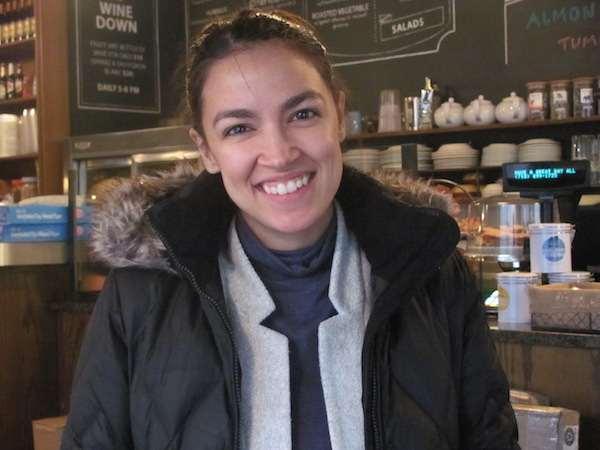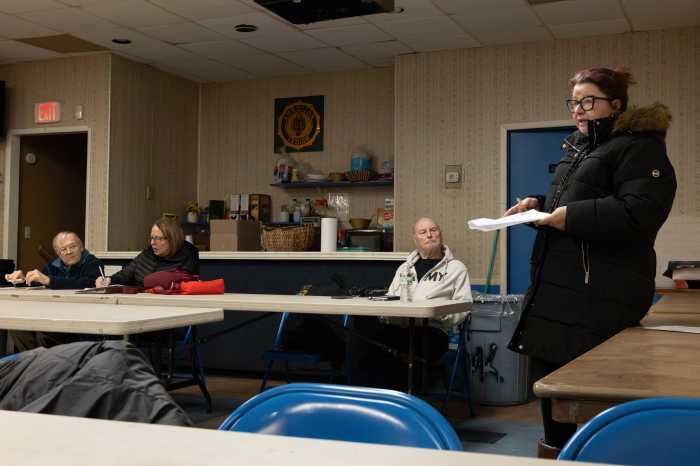Alexandria Ocasio-Cortez broke apart a chocolate chip cookie larger than her hand and mulled over her challenge to U.S. Rep. and Queens County Democratic Party Chair Joe Crowley (D-Sunnyside, Astoria, College Point, East Elmhurst, Jackson Heights, Corona, Woodside, The Bronx).
“The idea of challenging Joe Crowley, for some people, is like challenging God himself,” said Ocasio-Cortez, a former organizer for Bernie Sanders’ presidential campaign. “People whisper his name, but we can’t be allowed to govern ourselves by bureaucracy. In New York, that’s exactly what we got.”
Very few people decide to challenge Crowley because of this status as a powerbroker both in the city and in Washington, but this young Bronx Latina native wants to change not just the district’s representative, but also what she views a Democratic machine run by Crowley.

And Ocasio-Cortez is no novice to Washington politics. She was a staff member for the late U.S. Sen. Ted Kennedy (D-MA). Under him, she worked on foreign affairs and immigration issues involving constituents.
Yet, around the time she worked at Capitol Hill, Ocasio-Cortez didn’t view electoral politics as effective. She elaborated that politics “was so overrun with big money, corporate influence, [and] dynastic power.”
After her time ended in Washington, she returned to her hometown of the Bronx to teach kids how to read. Yet she would soon deal with another problem affecting millions across the country—the 2007-08 financial crisis.
The 27-year-old is not shy of discussing in public what happened during this time. Her father passed away and her family home was on the brink of foreclosure. To pay the bills, her mother worked as a bus driver and a housecleaner. Ocasio-Cortez, meanwhile, worked in restaurants as a waitress, sometimes working several shifts on little hours of sleep.
“There was something very animating about being in such a dire position that I realized that electoral politics was not something we could afford in ignoring. We can’t afford to give up our seats to special interests. We need to at least have the option,” she said.
Ocasio-Cortez decided to run against Crowley not only because he is her representative, but also because she views the primary race as an opportunity against a politician from the establishment. She questioned how Crowley first gained the seat in 1998.
Back then, former U.S. Rep. Tom Manton, another powerful Queens lawmaker, announced his re-election the race, until he announced his retirement, which allowed him to chose Crowley as his successor. Crowley won the election unopposed.
Ocasio-Cortez understands the odds stacked against her. Crowley raised over $2 million in contributions compared to about $60,000 raised for Ocasio-Cortez’s campaign, as of December 31.
The Bronx native wants to tackle issues as an authentic progressive. She favors ideas such as a minimum wage of $15 per hour, a plan to construct environmentally-minded projects in the district, defunding Immigration and Customs Enforcement, and tuition-free college for students.
The Democratic primary for the district is set for June 26, and Ocasio-Cortez is eager to speak with more residents in the district. She rejected advice given to her on speaking only with voters active in the primary as she favored talking with those often ignored in political circles, such as low-income people.
“Some of the communities that don’t vote know exactly what’s going on. But they feel cynical about what’s happening in government, so they don’t participate in it,” she said.
Ocasio-Cortez already received endorsements from a variety of organizations, several of which are progressive groups, and will obtain more in the future. Yet she is looking forward to talking to more residents, sharing her message, and creating a path for future candidates like her.
“Our duty is to prepare the next generation of leadership to challenge the whole thing from top to bottom,” she said. “So I don’t think that what we started this year is going anywhere.”









